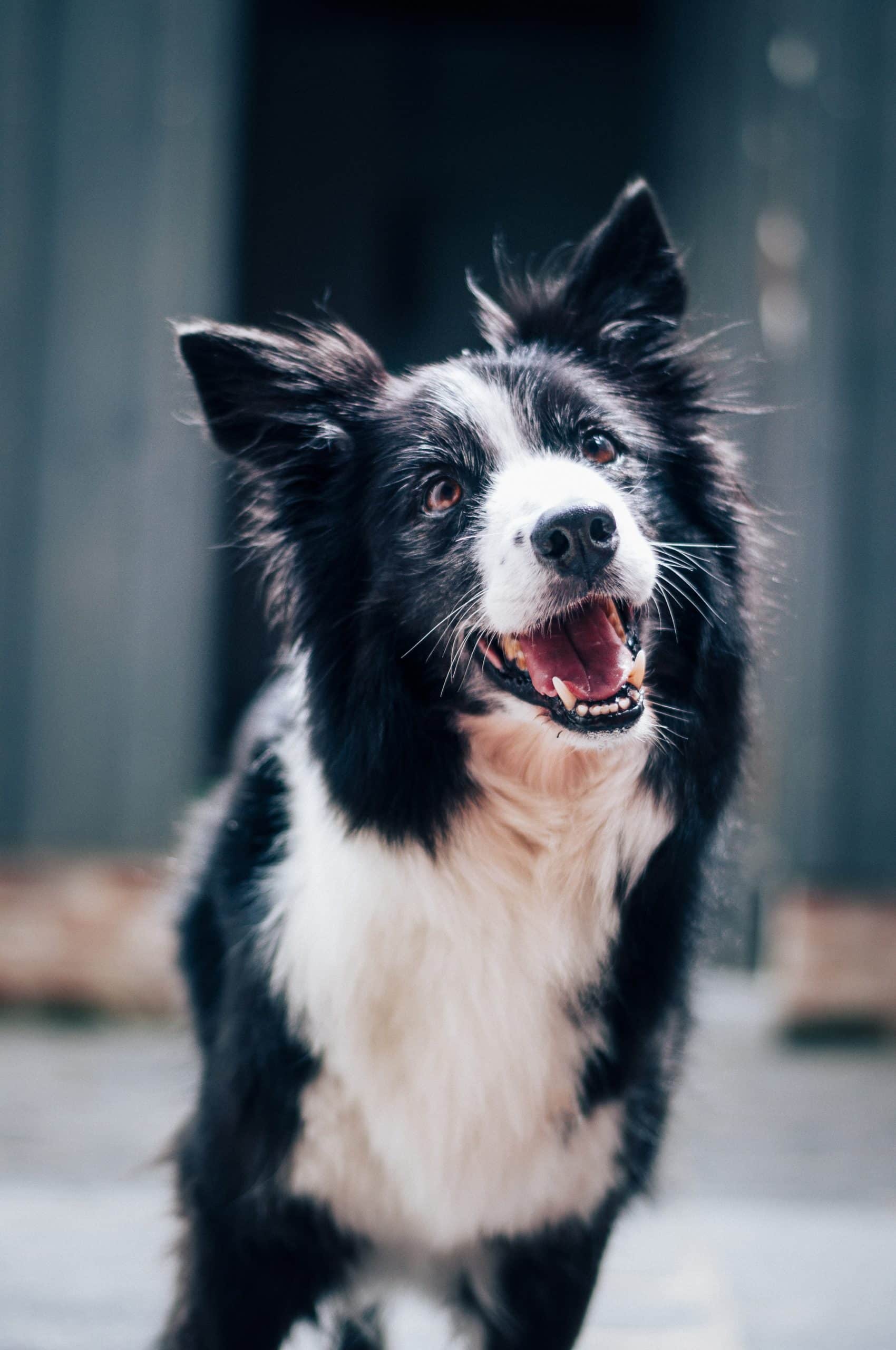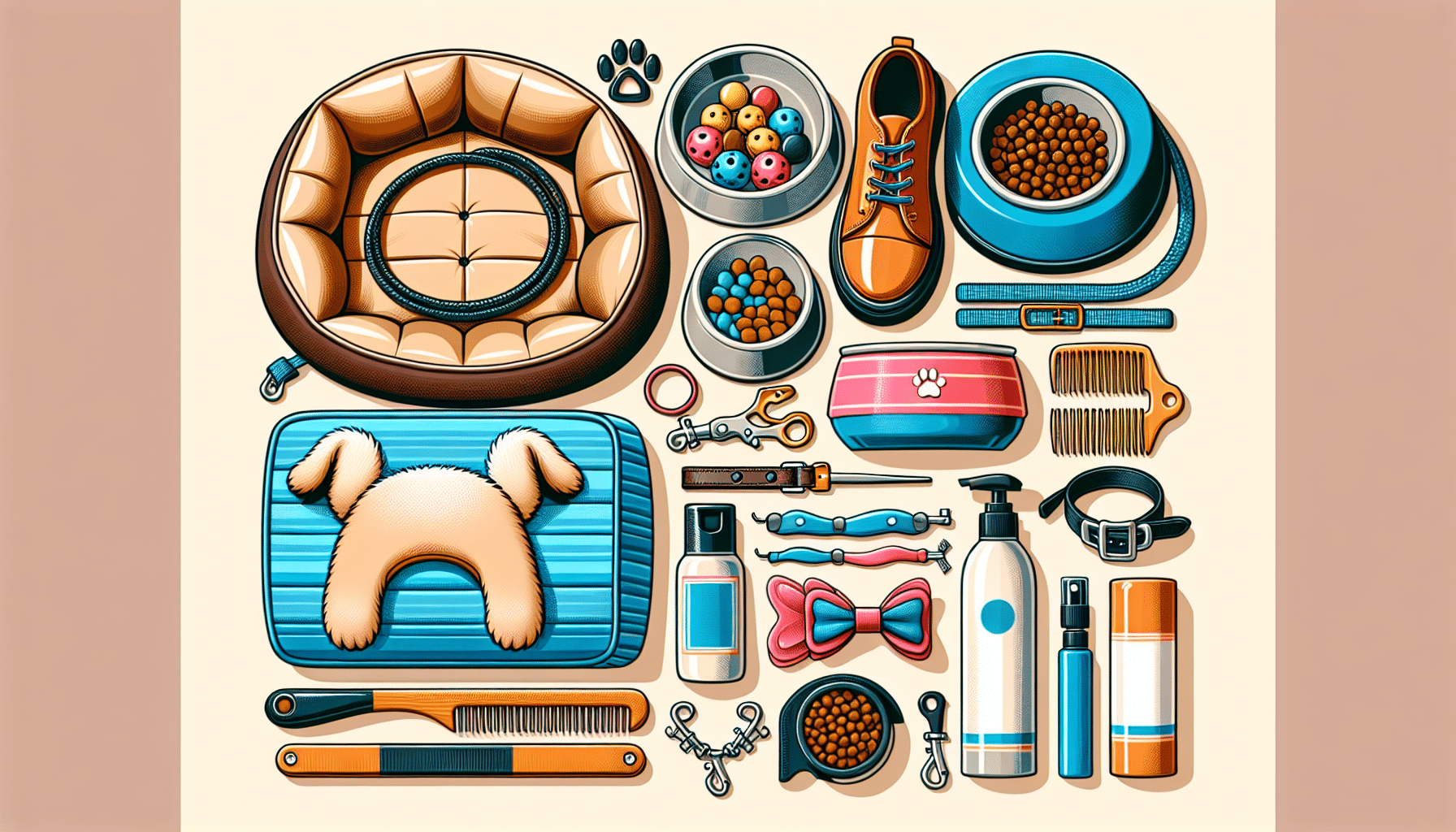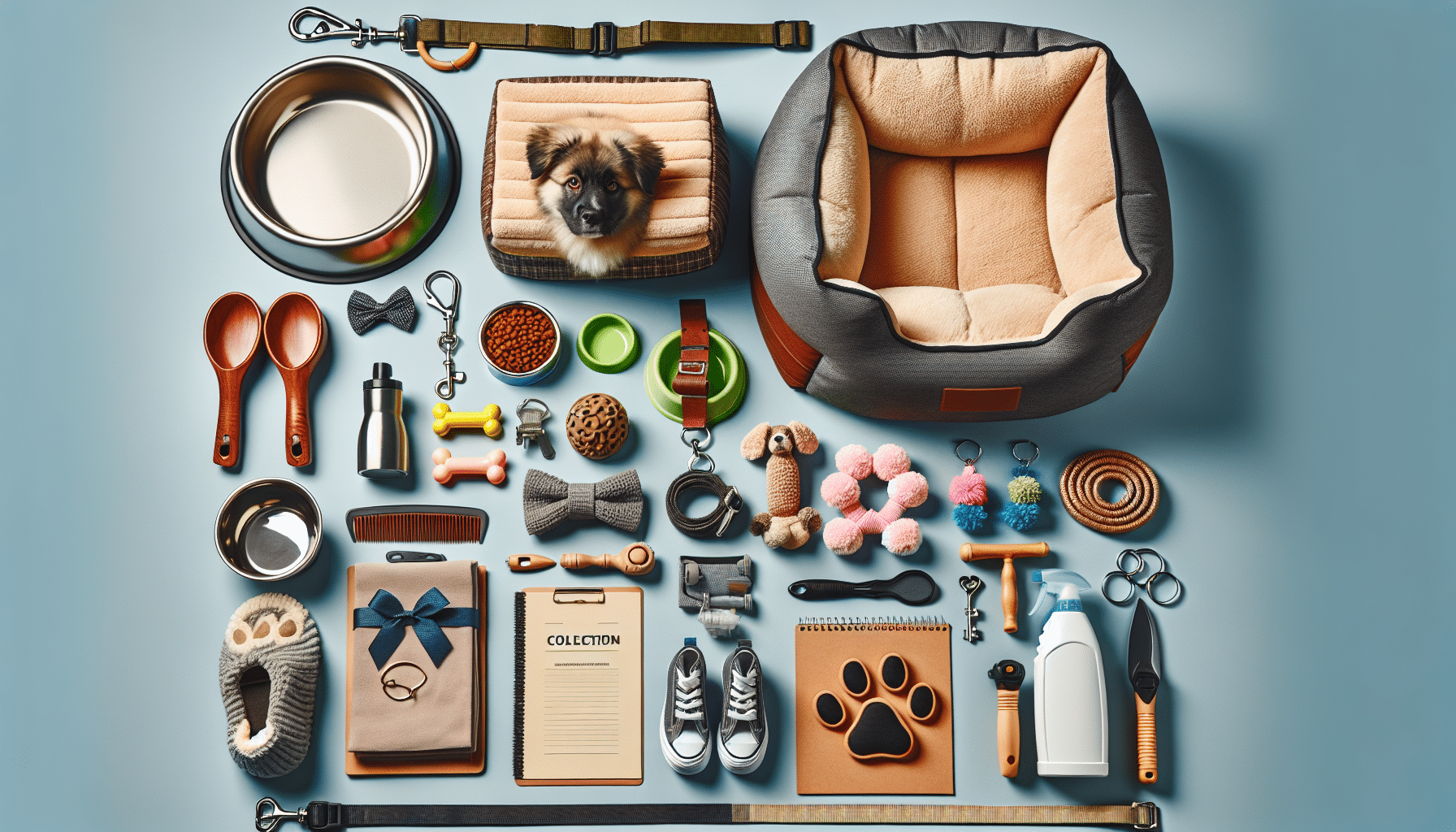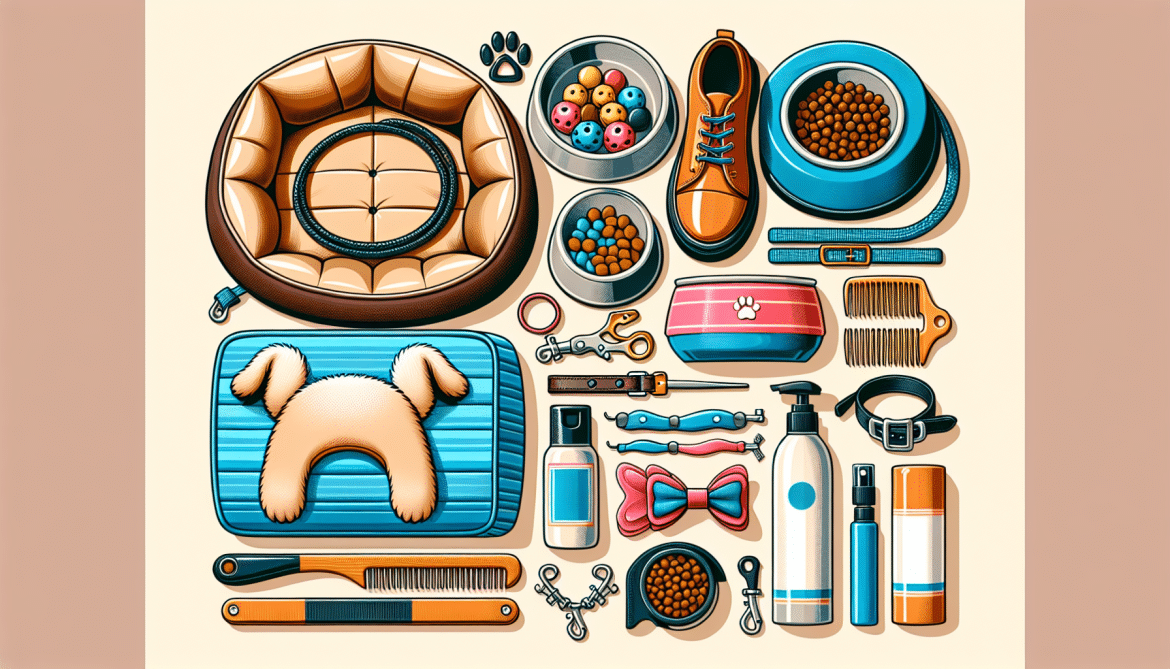Congratulations on becoming a new dog owner! As you embark on this exciting journey, it's important to have all the essential tools and knowledge to ensure a smooth transition for both you and your furry friend. That's why we have put together an informative guide, the "Essential Starter Kit for New Dog Owners: A Complete Guide." This comprehensive resource will provide you with everything you need to know, from choosing the right supplies to understanding your dog's needs and creating a loving environment. So, let's get started on this wonderful adventure together!
Essential Starter Kit for New Dog Owners: A Complete Guide
Congratulations on becoming a new dog owner! Welcoming a furry friend into your life is an exciting journey filled with love and companionship. As a new dog owner, it's important to be prepared and equipped with the essential knowledge and supplies to ensure a smooth transition for your new pet. This comprehensive guide will provide you with all the information you need to create the perfect starter kit and establish a strong foundation for a happy and healthy life together with your canine companion.

This image is property of images.unsplash.com.
Preparing Your Home
Before bringing your new dog home, it's crucial to make your living space dog-friendly and safe. This involves dog-proofing your space to prevent any accidents or mishaps and creating a safe space where your dog can feel secure.
Dog-proofing Your Space
Take a thorough look around your home and identify any potentially hazardous items or areas that need to be secured. Keep valuable and fragile items out of reach, secure loose cords and cables, and ensure that any toxic substances, such as cleaning products, are stored safely away. Also, consider using baby gates to block off restricted areas and prevent your dog from accessing them.
Creating a Safe Space
Dogs thrive when they have a designated safe space of their own, where they can retreat to relax and feel secure. This can be a crate, a comfortable bed, or a specific room in your home. Make sure to provide cozy bedding, toys, and water in their safe space. This dedicated area will not only provide them with a sense of security but also serve as a useful tool for training and housebreaking.
Supplies for Basic Care
To ensure that you are fully prepared for your new dog's arrival, it's important to have the necessary supplies on hand. Here is a list of basic items that should be included in your starter kit:
- Food and water bowls
- High-quality dog food
- Collar and leash
- Identification tags
- Dog bed
- Crate or kennel
- Chew toys
- Grooming supplies (brush, shampoo, nail clippers)
- Poop bags
- First aid kit for dogs
Now that your home is ready, let's move on to the next essential aspect of caring for your new dog - feeding and nutrition.
Feeding and Nutrition
The health and well-being of your new dog are greatly influenced by their diet. Providing a balanced and nutritious diet is essential for their growth, energy levels, and overall health.
Choosing the Right Food
When it comes to choosing the right food for your dog, it's important to consider their age, breed, size, and any specific dietary needs they may have. Consult with your veterinarian to determine the most appropriate type and brand of dog food for your furry friend. Opt for high-quality dog food that contains essential nutrients, provides a balanced diet, and avoids artificial additives or fillers.
Feeding Schedule
Establishing a regular feeding schedule is vital for maintaining your dog's health and helping with housebreaking. Puppies typically require more frequent meals than adult dogs, so plan for multiple meals throughout the day. As your dog grows older, you can transition to feeding them once or twice a day. Stick to a consistent schedule and avoid free-feeding, which can lead to overeating and potential weight issues.
Water and Treats
In addition to a balanced diet, your dog needs access to fresh and clean water at all times. Ensure that you have a suitable water bowl and replenish it regularly throughout the day. Treats can be a great way to reward good behavior and provide mental stimulation. However, be mindful of the calorie content and choose healthy treats that contribute to your dog's overall diet.
Now that your dog's nutritional needs are taken care of, let's explore the importance of daily exercise and mental stimulation.

This image is property of images.unsplash.com.
Daily Exercise and Mental Stimulation
Physical exercise and mental stimulation are key components of a happy and healthy dog's life. Regular exercise helps to maintain their physical fitness, while mental stimulation keeps their minds sharp and prevents boredom.
Finding the Right Exercise Routine
Dogs are naturally active animals and require daily exercise to burn off energy and stay fit. The exercise needs of each dog may vary based on their breed, age, and overall health. Some dogs thrive on a brisk walk or jog, while others may require more intense activities such as running, swimming, or playing fetch. It's essential to allocate dedicated time every day for exercise to keep your dog physically and mentally stimulated.
Enrichment Toys and Games
In addition to physical exercise, mental stimulation is equally important for a dog's overall well-being. Provide your dog with a variety of stimulating toys, such as puzzle toys, interactive feeders, and treat-dispensing toys. These toys engage their minds and keep them entertained, preventing destructive behavior that may result from boredom.
Training Basics
Incorporating basic training into your daily routine is essential for a well-behaved dog. Teaching your dog commands such as sit, stay, and come not only helps to establish a strong bond but also ensures their safety. Positive reinforcement techniques, such as treats and praise, are highly effective in training and can make the learning process enjoyable for both you and your dog.
Now that your dog's physical and mental needs are addressed, let's dive into the important topic of health and wellness.
Health and Wellness
Maintaining your dog's health and taking preventative measures is crucial for their overall well-being. Regular veterinary care, vaccinations, and preventive treatments are essential to keep them protected against diseases and parasitic infestations.
Vaccinations and Preventive Care
To safeguard your dog's health, it's important to follow a vaccination schedule recommended by your veterinarian. Vaccinations protect against common diseases such as rabies, distemper, and parvovirus. Additionally, regular check-ups and preventive treatments for parasites, such as fleas, ticks, and heartworms, are vital to keep your dog healthy and free from infestations.
Flea, Tick, and Heartworm Prevention
Fleas, ticks, and heartworms are common parasites that can cause serious health issues for your dog. It's crucial to use preventive treatments recommended by your veterinarian to protect against these parasites. Regular use of flea and tick preventives, as well as monthly heartworm preventives, will help keep your dog safe and comfortable.
Finding a Veterinarian
Establishing a relationship with a trusted veterinarian is an important aspect of responsible dog ownership. Research and choose a veterinarian who is experienced, knowledgeable, and someone you feel comfortable with. Regular veterinary visits allow for early detection of any health issues and provide an opportunity to address any concerns or questions you may have.
Now that you are well-informed about your dog's health needs, let's move on to grooming and hygiene.

This image is property of images.unsplash.com.
Grooming and Hygiene
Regular grooming not only keeps your dog's coat clean and shiny but also contributes to their overall health and well-being. Proper grooming techniques and practices help maintain healthy skin, prevent matting, and identify any abnormalities or health issues.
Brushing and Bathing
The frequency of brushing and bathing depends on your dog's breed and coat type. Regular brushing removes loose fur, prevents matting, and stimulates the skin. Bathing should be done as needed, using dog-specific shampoos and conditioners. Be sure to follow the recommended guidelines to avoid drying out your dog's skin or causing any irritation.
Nail Trimming
Keeping your dog's nails trimmed is an essential part of their grooming routine. Overgrown nails can be painful for your dog and may cause difficulty walking. Use a pair of specifically designed dog nail clippers and trim the nails carefully, avoiding the quick (the sensitive area containing blood vessels). If you are unsure or uncomfortable with nail trimming, consult a professional groomer for assistance.
Dental Care
Maintaining good dental hygiene is vital for your dog's overall health. Regularly brushing your dog's teeth with a dog-specific toothbrush and toothpaste helps prevent the buildup of plaque and tartar. Additionally, providing dental chew toys or treats designed to promote dental health can contribute to keeping their teeth clean and strong.
Now that your dog is clean and well-groomed let's move onto the section on socialization and training.
Socialization and Training
Socialization and training lay the foundation for a well-adjusted and well-behaved dog. Starting early and exposing your dog to different environments, people, and animals is crucial for their overall behavior and confidence.
Puppy Socialization
Socializing your puppy from a young age is essential for their development. Introduce them to various sights, sounds, smells, and experiences in a controlled and positive manner. Expose them to different people, animals, and environments to help them become comfortable and confident in new situations.
Obedience Training
Basic obedience training is an essential part of ensuring a well-behaved dog. Teach your dog basic commands such as sit, stay, come, and leash walking. Training should be done using positive reinforcement techniques, such as praise, treats, and rewards.
Behavior Management
Addressing unwanted behaviors and setting clear boundaries is an important aspect of dog ownership. Consistency is key when it comes to enforcing rules and addressing behavioral issues. Seek professional help or join a dog training class if you are struggling with specific behavior problems.
Now that your dog is well-socialized and trained, let's explore the topic of traveling and transportation.

Traveling and Transportation
Whether it's a trip to the park or a longer journey, traveling with your dog requires careful planning and consideration. Ensuring their safety and comfort during transit is essential to make the experience enjoyable for both you and your furry friend.
Travel Essentials
When traveling with your dog, it's important to have a few essential items on hand. These may include a comfortable and secure carrier or crate, food and water bowls, a leash, waste bags, and any necessary medication or documentation, such as vaccination records or identification tags.
Car Safety
If you are traveling by car, it's crucial to secure your dog properly to avoid any accidents or injuries. This can be achieved by using a dog harness or a crate that is securely fastened in the backseat or cargo area of the car. Avoid letting your dog roam freely in the car, as this can be distracting and dangerous for both you and your pet.
Air Travel and Flying with Your Dog
If you are planning to fly with your dog, it's important to check the airline's specific rules and regulations regarding pet travel. Some airlines allow dogs in the cabin, while others require them to be transported in the cargo hold. Be sure to research and comply with all the necessary requirements, such as crate specifications, health certificates, and restrictions on breed or size.
Now that you are equipped with the knowledge of traveling with your dog let's move on to establishing routines and boundaries.
Establishing Routines and Boundaries
Dogs thrive in an environment that provides structure and consistency. Establishing daily routines and setting clear boundaries helps your dog feel secure and understand what is expected of them.
Creating a Daily Schedule
Dogs are creatures of habit and thrive on routine. Establishing a daily schedule for meal times, exercise, training sessions, and rest will provide your dog with a sense of stability and structure. Stick to the schedule as much as possible, as this will contribute to a well-adjusted and contented dog.
House Training
House training is an essential aspect of living with a dog. Consistency, positive reinforcement, and patience are crucial when teaching your dog where and when to eliminate. Establish a consistent routine for bathroom breaks, reward your dog for going in the designated area, and avoid punishment for accidents.
Setting Rules and Boundaries
Setting clear rules and boundaries from the beginning helps your dog understand what behaviors are acceptable and what are not. Consistency is key when enforcing these rules, and positive reinforcement should be used to reward good behavior. Avoid confusing your dog by allowing certain behaviors sometimes but not others.
Now that you have established routines and boundaries in your home, let's dive into the important topic of first aid and emergency preparedness.

First Aid and Emergency Preparedness
Being prepared for any unexpected health issues or emergencies is essential as a responsible dog owner. Having a first aid kit and knowledge of common health issues will allow you to promptly address any concerns or seek veterinary help when needed.
Creating a First Aid Kit
Assemble a first aid kit specifically for your dog's needs. This should include items such as bandages, antiseptic wipes, tweezers, a rectal thermometer, disposable gloves, and any medications prescribed by your veterinarian. Familiarize yourself with the contents of the kit and how to use them.
Common Health Issues and Emergency Signs
Being aware of common health issues that affect dogs and recognizing the signs of emergencies is crucial for prompt intervention. Seek veterinary help if your dog is experiencing symptoms such as difficulty breathing, severe vomiting or diarrhea, seizures, sudden collapse, or any other abnormal behavior indicative of an emergency.
Knowing When to Seek Veterinary Help
While first aid knowledge and a well-stocked first aid kit are valuable, it's important to know when to seek professional help. Trust your instincts, and if you feel that your dog's condition requires veterinary attention, contact your veterinarian or an emergency veterinary clinic immediately. They are the best resource for assessing and treating your dog's health issues.
Now that you are well-prepared for potential emergencies, let's explore ways to build a community and find support as a new dog owner.
Finding a Community and Support
Building a community of fellow dog owners and accessing support networks is invaluable when navigating the journey of dog ownership. Connecting with like-minded individuals can provide you with advice, resources, and a support system to share the joys and challenges of being a new dog owner.
Local Dog Parks and Meetups
Dog parks and meetups are excellent places to socialize your dog and meet other dog owners in your area. These spaces provide a safe and controlled environment for your dog to interact and play with other dogs while allowing you to bond with fellow dog lovers.
Dog Training Classes and Workshops
Enrolling your dog in obedience training classes or workshops not only enhances their training and socialization skills but also offers an opportunity to meet other dog owners. These classes provide a structured environment for learning, and they can be a valuable resource for sharing experiences and seeking advice.
Online Forums and Resources
The internet is a vast source of information and support for dog owners. Online forums, websites, and social media groups dedicated to dog ownership offer a wealth of information and a platform to connect with other dog owners. These resources can provide valuable insights, tips, and answers to any questions you may have.
Congratulations! You have successfully completed our comprehensive guide to essential starter kits for new dog owners. By following these guidelines and implementing the information provided, you have laid a solid foundation for a fulfilling and harmonious relationship with your new furry friend. Remember, being a dog owner is a long-term commitment, and it requires love, dedication, and ongoing learning to ensure the well-being and happiness of your canine companion. Enjoy every moment of this beautiful journey, and cherish the unconditional love and joy that your dog brings into your life.


